& CURRICULum GUIDE EDUCATION
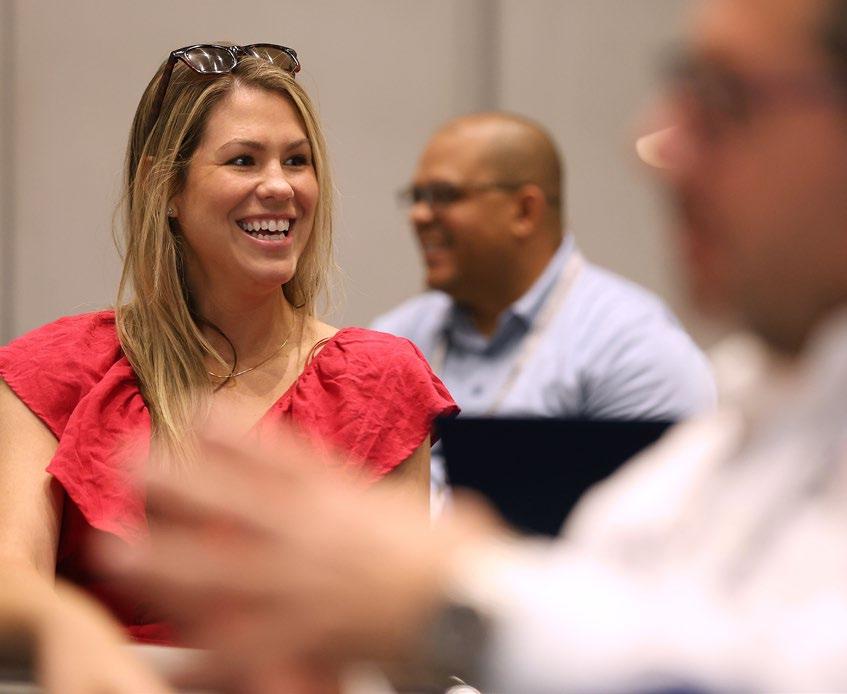

2023 AWARD WINNER SMC
1 CONTENTS 2 CEDIA Education 5 Training Options 6 Career Pathways 8 CEDIA Academy 9 Resources: Books, White Papers & Standards 10 CEDIA Certification 15 ECS Cards & Voucher Scheme 17 The Technician 18 SMART HOME TECHNICIAN ESSENTIALS 19 Intro to Smart Home Systems 20 Smart Home Science and AV 21 Extra-Low Voltage and Data Cabling for Smart Homes 22 Rack Building & Wiring Workshop 23 Electrical Safety & Safe Isolation 24 SMART HOME TECHNICIAN FURTHER SKILLS 25 Wired & Wireless Networking 26 Lighting Systems 27 Home Cinema Installation & Calibration Workshop 28 Smart Home Controls 29 Project Documentation & Processes 30 NETWORKING SPECIALIST 31 Residential Networking 32 Wireless Residential Networking 33 Advanced Residential Networking 35 THE DESIGNER 36 Design Documentation 37 Project Management 38 Home Cinema Design Workshop 39 Lighting Design 40 OTHER TECHNICAL COURSES 41 Designing Ethernet & Wireless Networking 42 KNX Basic Training 43 MEMBERS ONLY 44 CEDIA Outreach Instructor 46 OTHER TRAINING EVENTS 47 CEDIA Tech + Business Summits 48 International Events 49 Hire the Training Facility Version 10 | June 2024 | CEDIA UK Company Registration Number: 3353936 Information correct at time of going to press. CEDIA reserves the right to amend course content and pricing, without prior notification. E&OE.
Welcome to the CEDIA Education and Curriculum guide.
ABOUT CEDIA
CEDIA® is the Association for Smart Home Professionals™. Established in 1989, CEDIA remains founded on the principles of advocacy, connection, and education. Today, a community of over 30,000 CEDIA members from more than 80 countries deliver home technology solutions that enrich our lives.
CEDIA courses are developed by a global council of subject matter experts to give you the knowledge and skills to succeed in the industry. All CEDIA courses are based around science, engineering and real-world experience and are product agnostic.
Whether you are looking for a foot in the door into this exciting industry or are a seasoned industry professional, we have a course to suit your needs.
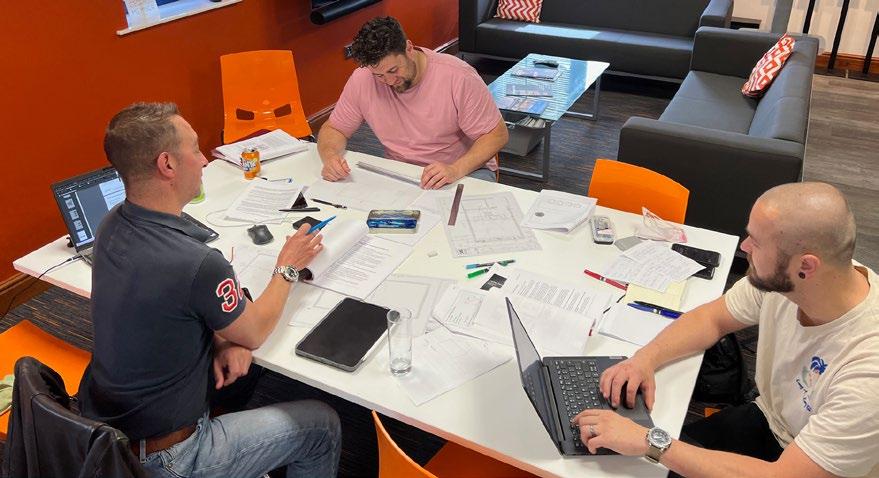
2
WHY CEDIA?
By training with CEDIA, you can access industry-leading education, resources and tutors. These are just some of the reasons why you should train with us...
CEDIA ACADEMY
The CEDIA Academy is the leading online learning portal for all your home technology integration learning. With 35+ self-paced courses available covering technical and networking skills, project management, KNX, business courses, and more, there’s something to suit every skill level.
TUTORS
CEDIA has a committed number of industry expert tutors who provide CEDIA training. Our tutors are dedicated to enhancing the knowledge of those in the industry, and ensuring that every home technology business stays competitive in an evolving sector.
EDUCATIONAL PROGRAMMES
From boot camps, conferences, and trade show courses, to webinars, online classes, and hands-on workshops, CEDIA gives you extraordinary access to the most comprehensive educational programmes available.
CEDIA CERTIFICATIONS
CEDIA’s certification credentials allow industry professionals to demonstrate their expertise at every level and enable businesses to show their commitment to best practices.
CEU ACCREDITATION
CEDIA CEU Training Partners offer a wide range of courses that allow attendees to gain CEU points toward their continuing professional development.

BESPOKE TRAINING PACKAGES
We can create tailor-made training packages to suit the needs of your company and your employees. Save time and money on travel expenses by having one of our experienced tutors come to you.
3
WHY CEDIA?
RESOURCES AND PUBLICATIONS
Members gain full access to a library of business operations templates as well as white papers that drill down into specific topics. Members also save on CEDIA Reference Books, which provide a framework for the knowledge needed to be successful in the industry.
STANDARDS AND RECOMMENDED PRACTICES
Browse in-depth guides on topics such as immersive audio design, home cinema video design, smart grid devices, and design documentation symbols.
ASSESSMENT TESTS
We offer assessments to help gauge the knowledge and skills of not just current employees, but also prospective new hires.
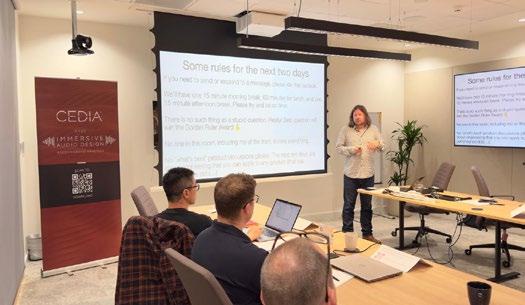
CEDIA HOSTS VARIOUS EDUCATION EVENTS THROUGHOUT THE YEAR THAT ARE NOT LISTED IN THIS GUIDE. KEEP AN EYE ON OUR WEBSITE FOR DETAILS CEDIA.ORG/EVENTS
4
TRAINING OPTIONS
There are many different ways to train with us, with the most popular being face-to-face training at our facility in Cambridgeshire.
Although we recommend attending one of our practical training courses, there are also a number of other ways in which you can increase your knowledge with us including:
Taking an online course or hybrid via the CEDIA Academy
Reading our textbooks, white papers or industry standards
Watching a webinar
Attending a regional Tech Summit event
Attending Manufacturer CEU Training
Attending ISE or CEDIA Expo
For more information on CEDIA events near you, visit cedia.org/events
5
Career PathWAYS
I want to become a Technician
If you are just getting started in the home technology industry and are looking to become a technician, we recommend you begin with taking our Smart Home Essential Skills or Further Skills packages. These courses will provide you with a great foundation of knowledge for establishing a career in this sector.
I want to expand my technical knowledge
If you already have some technical experience and are looking to expand your knowledge and skills, we would recommend the Smart Home Technician Further Skills training (page 24). This will provide you with the knowledge and resources to help you prepare for the intermediate level Integrated Systems Technician (IST) certification exam.
I want to become a Designer
If you are already an established installer and are looking to progress into the design side of custom installation, we have several courses that also suit the Designer role. These courses explore the process of system design, including drawing and processing, documentation, as well as managing the project itself. They are also beneficial to those already in a design role who are looking to further their existing knowledge.
I want to become CEDIA Certified
If you are ready to prove you’ve mastered a particular skillset and you would like to earn your certification, CEDIA has four different certification options for every skill level. Take a practice test and found out if you’re ready for our CIT, IST, ESC-N, or ESC-D certifications (see page 10).
2023 AWARD FINALIST
TECHNOLOGY

CEDIA TRAINING CAN HELP YOU ACHIEVE AWARD WINNING STANDARDS OF WORK.
PLEASE SEE CEDIA.ORG/AWARDS FOR PREVIOUS WINNERS.
6
BNC

IMMERSIVE AUDIO DESIGN
RECOMMENDED PRACTICE
The new recommended practice for immersive audio design (RP22) redefines how we quantify system performance.
This is the first time that system performance metrics are defined by four distinct levels, instead of vague “good, better, best" packages or “low, middle, high" cost models.
ENDORSED BY INDUSTRY LEADING BRANDS





And the new definitions aren’t just for integrators’ benefit... With RP22, manufacturers know their products are functioning as intended; customers understand the breadth of what they are paying for.
Having clearly defined levels not only holds integrators accountable, it also elevates our industry to the highest professional standard.

RP22
scan to join the new Paradigm in Immersive Audio Design Excellence!
CEDIA ACADEMY
While face-to-face training is extremely important to grow your knowledge, an online training portal is useful to those who find it difficult to take time away from their business.
Our online training portal, CEDIA Academy, has introduced a variety of supporting online courses to allow students to further their skills at a time most convenient to them.
From cable and connector properties, to project and business processes, you will be able to find an online course that caters to your needs.
Visit cedia.org/academy to view the full online training catalogue.
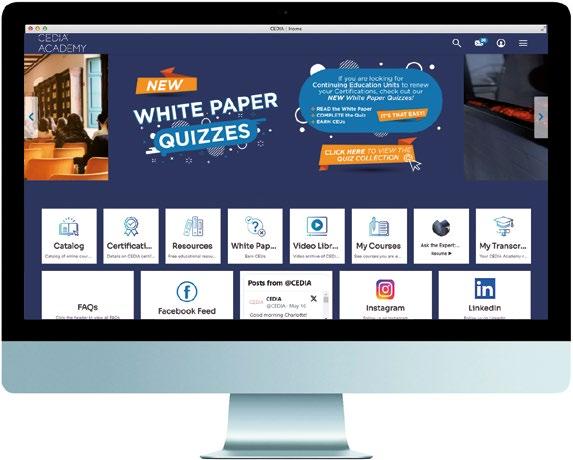

8
Resources: BOOKS, WHITE PAPERS & STANDARDS
Using a select team of industry volunteers, CEDIA has developed an extensive collection of guides, publications, best practice documents and white papers to help with your study and aid your continued professional development.
BOOKS
Our most popular books include:
- Fundamentals of Electronic Systems
- Advanced Residential Electronic Systems
- Cabling & Infrastructure Technician textbook
- Integrated Systems Technician textbook
WHITE PAPERS
Our white papers cover a wide-range of specific topics and some are also available in multiple languages. Some of the most popular topics include; Business Toolkit series, 4K Technology, Bio-Adaptive Lighting, Audio Design and many more.
STANDARDS
CEDIA has worked with the BSI to produce a new Publicly Available Specification (PAS) 35491:2017: Design and Installation of Telecommunications and Broadcast Infrastructure within the Home - Code of Practice.
This PAS recommends how to design and install domestic wiring which is service-provider-neutral. It aims to give occupants the service availability that they want while making it easy for them to change service provider without the need for additional cabling or upheaval. It applies to single residential dwellings and most homes of multiple occupation.
OTHER RESOURCES
We also provide many other useful resources including The CEDIA Podcast, webinars, case studies and more.
To view all of the resources available to you, visit cedia.org

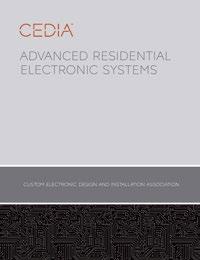
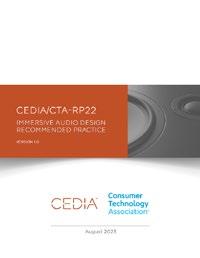
9
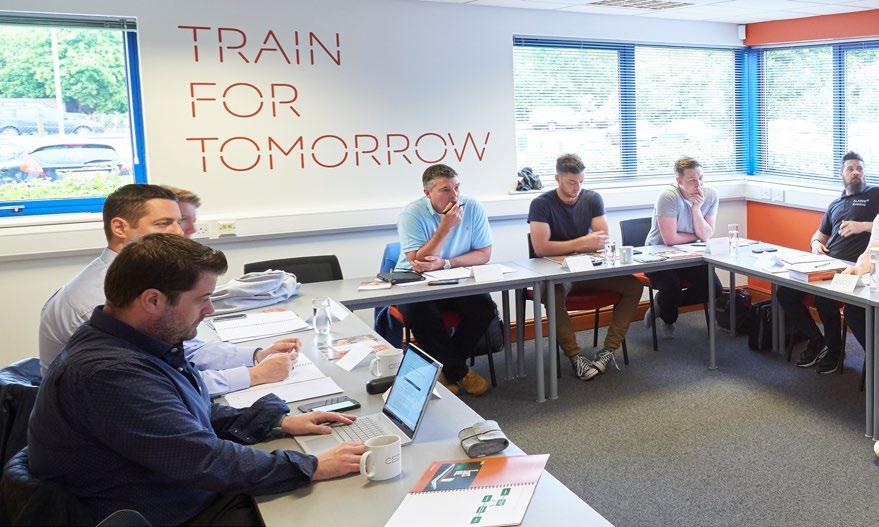
CEDIA CERTIFICATION
CEDIA Certification is a set of four credentials that reflect defined areas of knowledge in the home technology industry.
Earning and retaining certification allows you to demonstrate that you have completed the required study and field experience to master a particular skillset and body of knowledge.
Certifications are held by the individual; you earn the certification, and you carry it with you as you continue your career.
10
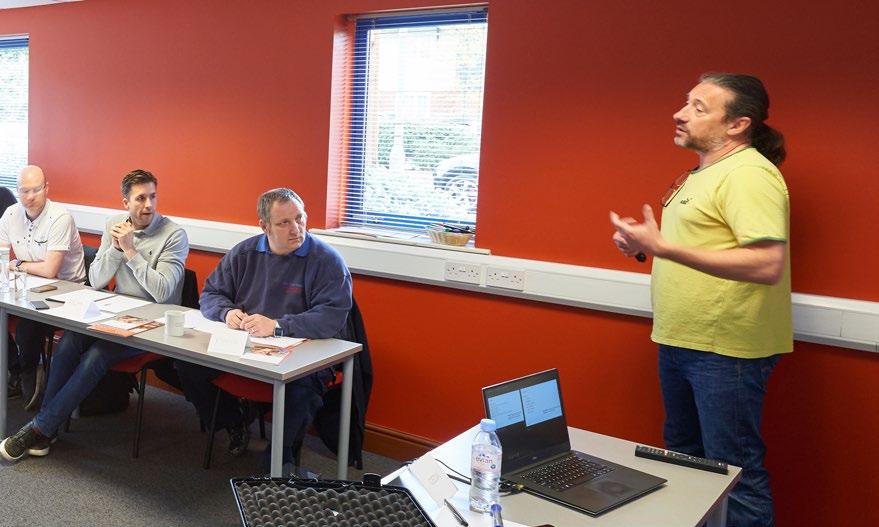
Cabling & Infrastructure Technician (CIT) Certification
This certification represents a technician whose primary task is to perform basic infrastructure wiring for low-voltage technology systems in a residential or commercial setting. Certified technicians are able to use proper tools and techniques, follow instructions per project documentation, and operate in a safe and professional manner on the jobsite.
Integrated Systems Technician (IST) Certification
This certification represents a technician who can work independently to perform all functions related to the pre-wire (First Fix) and trim-out (Second Fix) phases of a project including troubleshooting common errors and verifying system functionality. Certified technicians follow best practices to properly mount and install a wide range of home technology equipment in racks and throughout a residence.
Networking Specialist (ESC-N) Certification
If you think you’ve mastered the fundamentals of residential networking, including infrastructure, design, and configuration, then consider taking the CEDIA Electronic Systems Certified Networking Specialist (ESC-N) exam.
Designer Specialist (ESC-D) Certification
Selecting products, creating schematics and drawings, forming budgets, and developing programming. These are just some of the everyday tasks of an electronic systems designer. The ESC-D is CEDIA’s highest level certification.
11
CEDIA CERTIFICATION
4-STEP GUIDE TO PREPARING FOR CEDIA CERTIFICATION
CEDIA makes it easy for you to prepare for a certification exam and provides a variety of resources to fit your learning style and busy schedule. Each certification has a clearly defined body of knowledge – and a variety of learning options, which are most effective when used together in a blended approach.
1
SELECT THE RIGHT CERTIFICATION
Find the certification that is right for you from the CIT, IST, ESC-N, and ESC-D certifications.
2
Identify Knowledge Gaps
• Review the Exam Blueprint which lists knowledge and skills assessed for each section of the exam.
• Take the Free Practice Tests to get a better idea of the types of questions you may see on the exam.
Pursue Additional Learning
3
4
• CEDIA textbooks
• CEDIA online learning pathways
• Classes offered at CEDIA Expo, ISE or Tech Summits
• White papers
• Standards and recommended practices
• On-the-job training with your employer
Submit Certification Application & Schedule a Test Date
• Purchase voucher online at cedia.org/certification
• Redeem voucher and complete application form
• Schedule exam in Kryterion’s Webassessor platform
• Take the exam (Results are available upon completion)
CEDIA Certifications cover a range of knowledge and skills and are intended for professionals at different stages of their career. You can learn more about each certification, plus find exam blueprints, practice tests and further resources, online at cedia.org/certification .
12
CEDIA CERTIFICATION
TAKING YOUR CERTIFICATION EXAM
CEDIA has partnered with Kryterion Global Testing Solutions to enable students to take Certification exams all over the globe.

Kryterion has more than 1,000 testing centres worldwide, it has never been easier to take your CEDIA Certification exam.
To find a test centre near you visit www.kryteriononline.com
EXAMINATION COSTS ONLY
CIT
Members
£130 +VAT
Non-Members
£170 +VAT
ACCREDIBLE
£170 +VAT
Non-Members
£250 +VAT
£170 +VAT
Non-Members
£250 +VAT
£170 +VAT
Non-Members
£250 +VAT
CEDIA provides a set of tools to help integrators market their certifications to both homeowners and to their fellow industry professionals. This includes access to digital badges through Accredible.
Digital Badging is a simple and trusted way to share credentials and abilities. It provides that extra step in verification and professionalism. Through Accredible, digital badges are awarded whenever an exam is passed and are automatically updated and renewed along with each certification.
If you are currently CEDIA Certified, we highly recommend using this digital badge along with your logo, see the examples shown here.
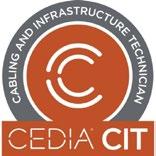
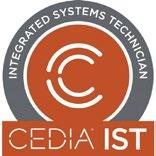
13
IST
Members
ESC-N Members
ESC-D
Members
CEDIA CERTIFICATION
Maintaining Your Certification
CIT certification is valid for three years. One this has expired, it is renewed by completing the renewal application and renewal fee, plus completing an approved free, 3-hour “CIT Renewal Course”.
IST, ESC-N, and ESC-D certifications are also valid for three years, and may be maintained by earning 30 continuing education units (CEUs) over the three year period. If you do not achieve 30 CEUs in this time, you have the option to take a renewal exam.
Earning CEUs
You can earn points in many ways including attending CEDIA training, attending shows such as EXPO or ISE, or by attending training from an approved CEU Provider. You can even earn points by listening to the CEDIA podcast!
To view a list of all CEU Approved Provider training, visit cedia.org/ceus
Why are CEUs important?
By earning CEUs, it shows that you are dedicated to continuing education and progressing your career within the industry.
You will be able to serve your business community with a specialised skill set and enhance their way of life with up-to-date best practice solutions for complicated issues.
14
ECS CArds
CEDIA has collaborated with the Electrotechnical Certification Scheme (ECS) to bring you the only Home Technology Integrator ECS related discipline card in the industry.
To qualify for this card, you must meet the following requirements:
• hold a valid ECS Health & Safety Assessment (taken within the last 2 years)
• hold a valid ECS Electrical Safety Unit Assessment
• hold a current CEDIA CIT or IST Certification.
If you’re looking to apply for an ECS card, you can purchase our ECS Assessment bundle that includes: ECS Health & Safety and Electrical Safety Unit Assessments, plus the online Basic Electrical Safety course, from £99 + VAT.
For more information, visit our website, or contact education@cedia.org
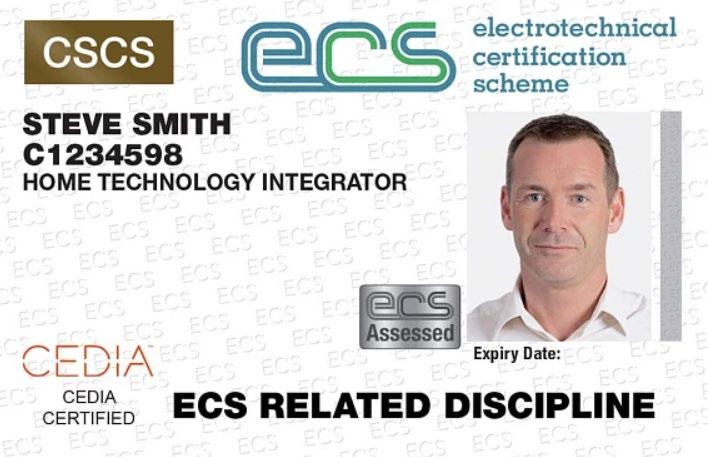
15

16
THE TECHNICIAN
A Technician is the person who installs, configures, and maintains electronic systems in the field. This includes installing the infrastructure (cabling etc.), the equipment, the control systems, and user interfaces. Many Technicians do their work based strictly on a work order, which is created by someone else. But in a smaller company the same person may specify the equipmemt and design the system, and then install it themselves.
A good technician has an understanding of how signals and electricity work, allowing them to solve problems and troubleshoot issues in the field when necessary. Some people who love working with their hands, and the satisfaction of seeing their work through to completion, work their entire career in the field as a technician.
They continue to learn and expand their skillset over the years and become more and more valuable as they become adept at system calibration, programming, troubleshooting etc. They may become a Lead Technician or crew leader, supervising the work of other technicians and mentoring them as they learn new skills.
17
Smart Home Technician Essentials
5-DAY PACKAGE
• Member: £899 (+VAT)
• Non-Member: £1,399 (+VAT)
Prices include a copy of CEDIA’s Cabling & Infrastructure Technician textbook
KEY SKILLS YOU WILL LEARN:
• Cable termination
• Cable lacing
• Testing and troubleshooting
• Rack design
• Equipment installation
• Ohm’s law calculations
• Triangles, percentage and ratios calculations
During this five course pathway, you will learn the best practices for cable termination and installation and learn the basic testing and qualification methods for structured cabling. You will also learn and practice the key techniques for audio, video and network calculations and gain the knowledge and skills to correctly plan, design, and install AV racks.
CEDIA’s certified subject matter experts will share a vast amount of technical knowledge with you and will be on hand to support you through your learning. Across the five days, you will get involved in hands-on activities designed to give you a feel for those on-the-job tasks.
These five courses are available individually or as a discounted package.
THE PATHWAY INCLUDES THE FOLLOWING COURSES:
• Intro to Smart Home Systems (page 19)
• Smart Home Science and AV (page 20)
• Extra-low Voltage and Data Cabling for Smart Homes (page 21)
• Rack Building & Wiring Workshop (page 22)
• Electrical Safety & Safe Isolation (page 23)
WHO SHOULD ATTEND THIS COURSE?
• New hires and entry-level technicians
• Career changers
• Electricians and aerial installers seeking to grow into the smart home industry
• Technicians preparing for CEDIA’s CIT and IST certifications
RECOMMENDED READINGS:
• CEDIA’s Cabling and Infrastructure Technician textbook
• CEDIA White Paper: Smart Home Infrastructure Recommended Guidelines
18
Intro to Smart Home Systems

OVERVIEW
The need for a proper cabling infrastructure is essential in any custom installation project. Most homes provide little of the wiring needed for true system integration.
This workshop will show attendees the various cables and connectors used in integrated residential systems, and demonstrate how to build a flexible wiring environment for a modern home. Attendees will learn how to terminate, verify & qualify the wiring installation.
This is an interactive workshop with practical exercises using a range of tools, test and qualification equipment, giving attendees the vital hands on experience required to advance their skill set and industry knowledge.
TOPICS COVERED INCLUDE:
- Identifying the various cables and connectors in Smart Home systems.
- Applications where various cables and connectors are used.
- Best practice connector termination methods.
- Practical exercises using various ELV and data cables and connectors.
- The basics of structured cabling systems.
- Using patch panels and wall-plate modules.
- Basic testing and qualification methods for structured cabling installations.
WHO SHOULD ATTEND?
- Junior technicians with some/little industry experience.
- Employees that are new to the workforce.
- Those looking to transition into the smart home industry.
COSTS
19 Smart Home Technician Essentials
Members £199 +VAT Non-Members £299 +VAT
Smart Home Science and AV

OVERVIEW
Moving into the Smart Home installation industry requires a wide range of practical skills and technical knowledge. New installation technicians need a strong grounding in maths, science and project procedures.
The course provides attendees with the essential training in the typical maths, science and electronics topics installers utilise within the Smart Home industry. Attendees will explore the key techniques for audio, video and network calculations, and will be asked to apply these skills to solve example scenarios.
Also included are specific explanations of how audio, video and RF (Radio Frequency) systems function with system examples.
TOPICS COVERED INCLUDE:
- Understanding and manipulating simple mathematical formulae.
- Working with triangles, percentages and ratios.
- The relationship between waves, frequency and wavelength.
- Electricity and electrical theory.
- How sound & audio work.
- Video display & transmission basics.
- RF signal function inc. modulation.
WHO SHOULD ATTEND?
- Junior technicians with some/little industry experience.
- Employees that are new to the workforce.
- Those looking to transition into the smart home industry.
RECOMMENDED READINGS:
- CEDIA’s Cabling and Infrastructure Technician textbook.
COSTS
20
Smart Home Technician Essentials
Members £199 +VAT Non-Members £299 +VAT
Extra-Low Voltage and Data Cabling for Smart Homes

OVERVIEW
The need for a proper cabling infrastructure is essential in any custom installation project. Most homes provide little of the wiring needed for true system integration.
This workshop will show attendees the various cables and connectors used in integrated residential systems, and demonstrate how to build a flexible wiring environment for a modern home. Attendees will learn how to terminate, verify & qualify the wiring installation.
This is an interactive workshop with practical exercises using a range of tools, test and qualification equipment, giving attendees the vital hands on experience required to advance their skill set and industry knowledge.
TOPICS COVERED INCLUDE:
- Identifying the various cables and connectors in Smart Home systems.
- Applications where various cables and connectors are used.
- Best practice connector termination methods.
- Practical exercises using various ELV and data cables and connectors.
- The basics of structured cabling systems.
- Using patch panels and wall-plate modules.
- Basic testing and qualification methods for structured cabling installations.
WHO SHOULD ATTEND?
- Junior technicians with some/little industry experience.
- Employees that are new to the workforce.
- Those looking to transition into the smart home industry.
RECOMMENDED READINGS:
- CEDIA’s Cabling and Infrastructure Technician textbook.
- CEDIA White Paper: Troubleshooting for the Home Technology Professional.
COSTS
21 Smart Home Technician Essentials
Members £199 +VAT Non-Members £299 +VAT
Rack Building & Wiring Workshop

OVERVIEW
Racks are now an integral element of many custom installations. Pre-planning, including best practice design and standardisation, can ensure every rack is given the time and attention required to result in a tidy, reliable and serviceable solution.
This course will provide attendees with the clear, structural methodology required for rack building from planning through to future servicing. This heavily practical course will explore best practices, the importance of science based wiring choices and standardisations which can be applied to projects of all sizes.
Attendees can expect to gain a strong understanding of the different types of racks, and how to apply the correct knowledge for overcoming issues with equipment placement, wiring, connectivity, and rack build as a whole.
COSTS
TOPICS COVERED INCLUDE:
- Rack elevations, kit spacing and ventilation (best practices for loading and kit spacing including ventilation of racks).
- Cable tray, rear rack strip and lacing bars.
- Tails, rear panels and hardwiring.
- Cable and signal paths.
- Service loops and cable lay.
- Cable ties - tightness, flush cut, spacing and flow.
- Lacing pre-made cables.
WHO SHOULD ATTEND?
- This course is suitable for both new and developing installers and technicians. Any prior knowledge of custom installation would be useful.
22
Members £199 +VAT Non-Members £299 +VAT Smart Home Technician Essentials
Electrical Safety & Safe Isolation
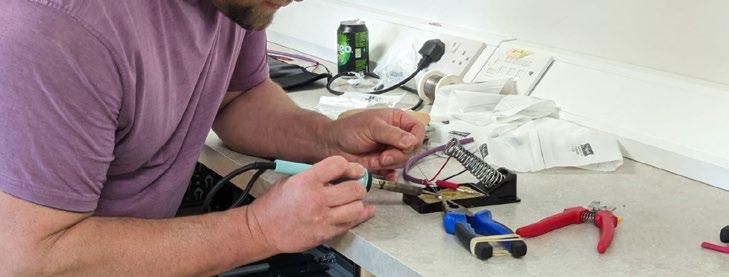
OVERVIEW
Electrical installations are part of every project, which means that basic electrical safety is essential knowledge for all smart home technicians working in UK homes.
In this course, learners will be introduced to the UK’s electrical regulations, the dangers of electricity, and the professional parameters and safe working practices to use when working on electrical installations. Successful completion of the course and the ECS Electrical Safety assessment (coupled with verified competence in their work area) enables the successful candidate to apply for an ECS Related Discipline card in a predefined occupation. This card is essential when working with electrical systems on a live construction site.
WHO SHOULD ATTEND?
- New entrants and installation technicians who are entering the smart home industry.
- Individuals looking to gain an ECS Related Discipline card or the CEDIA Home Technology Integrator ECS card.
As an alternative to this in-person training, CEDIA also provides an online, self-paced training course in CEDIA Academy – Basic Electrical Safety (UK). The online course is helpful for individuals that are looking to apply for an ECS Related Discipline card, and need to fit training around their busy schedules.
See more information on our ECS Assessment and online course pricing on page (page 15).
RECOMMENDED READINGS:
- CEDIA White Paper: Safety Tips and Regulations for Electronic Systems Professionals.
COSTS
23
Smart Home Technician Essentials
Members £199 +VAT Non-Members £299 +VAT
Smart Home Technician Further Skills
5-DAY PACKAGE
• Member: £899 (+VAT)
• Non-Member:
£1,399 (+VAT)
Prices include a copy of CEDIA’s Integrated Systems Technician textbook.
During this 5-day course, you will learn the best practices for home cinema and media room installation and gain the knowledge and skills to implement lighting control protocols into a system design. You will also learn and practice how to configure a typical router and correctly setup a secure WiFi network, as well as the best practices for control system commissioning. Additionally, you will explore some of the project and business processes that you can expect to be involved in as a technician, as well as the terminology and phases you’ll encounter on an on-site project.
CEDIA’s certified subject matter experts will share a vast amount of technical knowledge with you and will be on hand to support you through your learning. Across the five days, you will participate in hands-on activities designed to give you a feel for those on-the-job tasks.
THIS PATHWAY INCLUDES THE FOLLOWING COURSES:
• Wired & Wireless Networking (see page 25)
• Lighting Systems (see page 26)
• Home Cinema Installation & Calibration Workshop (see page 27)
• Smart Home Controls (see page 28)
• Project Documentation & Processes (see page 29)
THIS PATHWAY IS IDEAL FOR:
• Junior technicians with some industry experience
• CIT certified technicians preparing for CEDIA’s IST certification
• Anyone looking to expand their knowledge on systems integration
RECOMMENDED READINGS:
• CEDIA Integrated Systems Technician textbook
• CEDIA Advanced Residential Electronic Systems textbook
24
wired & wireless networking

OVERVIEW
IP networking is arguably the most important topic in the home technology industry. This course provides an introduction to IP networks and their place within residential installations.
The course is ideal for both beginners and individuals looking to learn, formalise and increase their IP networking knowledge.
TOPICS COVERED INCLUDE:
- Layers 1-3 of the 7 layer OSI Model and how they relate to networks.
- Applying the OSI model in network troubleshooting.
- Recognising and understanding basic network hardware.
- IP Addressing - using the right addresses for the right job.
- The difference between server, client and infrastructure devices.
- Basic network testing.
LEARNING OUTCOMES:
- Explain simple network terms such as IP address, MAC address, DHCP & DNS.
- Describe the layout and scope of star, bus and mesh networks.
- Configure a typical consumer router for LAN devices and WAN access.
- Configure a range of host devices with dynamic, reserved dynamic and static IP addresses.
- Setup a basic but secure Wi-Fi network using a single access point.
- Test a host devices’ network status up to OSI layer 3.
COSTS
25
Smart Home Technician Further Skills
Members £199 +VAT Non-Members £299 +VAT
Lighting Systems

OVERVIEW
Understanding lighting and lighting control systems are essential to successfully provide the homeowner with a great ambiance and realise the lighting designer’s aesthetic. A cornerstone for all custom installers’ product sets, lighting controls can provide additional revenue as well as routes to new market segments.
This course will aid professionals to learn more about integrating lighting control into their projects, and exploring the topics of lighting-specific control, in the context of a smart home installation.
The course is ideal for new and developing installation engineers and technicians and is the ideal primer for the curriculum of the IST certification exam.
TOPICS COVERED INCLUDE:
- Lighting dimming protocol.
- LED control.
- DIY lighting controls.
- Part L compliance.
- Basic heating and cooling.
- The DIY marketplace.
LEARNING OUTCOMES:
- Understand current lighting control protocol & how to implement them in a system design.
- Understand how to use LED lighting including tapes and colour changing systems.
- Explain and comply with Part L of Building Regulations and design heating and lighting systems in accordance with the regulations.
- Understand the DIY market place and how to interface to it.
COSTS
26
Smart Home Technician FURTHER SKILLS
Members £199 +VAT Non-Members £299 +VAT
Home Cinema Installation & Calibration Workshop

OVERVIEW
Home Cinema and media room technology are among the most commonly requested systems for new smart home installations. Integrating audio, video and control systems together into a home cinema environment, is a common task for smart home designers and installers.
This course will provide attendees the essential skills required to install a standards compliant home cinema or media room. The workshop style of this course means every student will learn in a hands-on manner. The day includes the building of a modest home cinema including typical audio and video components. Once the basic home cinema is complete each student will try their hand configuring the basic audio setup of a typical AV Receiver and go on to basic video calibration of the display using test materials.
COSTS
TOPICS COVERED INCLUDE:
- The role of the AV receiver in a home cinema room.
- Configuring common sources of AV content.
- Video display technologies and setup.
- Speaker system technologies and setup.
- Basic audio and video calibration.
- HD Video distribution methods.
- The home cinema environment.
WHO SHOULD ATTEND?
- List the basic components of a home cinema system.
- Explain the role of each home cinema system component.
- Setup a home cinema from common components.
- Calibrate the video picture and sound for initial viewing.
- Discuss three HD video distribution methods.
RECOMMENDED READINGS:
- CEDIA White Paper: An Integrator’s Guide to Video Resolution.
- CEDIA White Paper: An Integrator’s Guide to HDR Video.
27
Smart Home Technician Further Skills
Members £199 +VAT Non-Members £299 +VAT
SMART HOME CONTROLS

OVERVIEW
Controlling the technology of a smart home is essential to bringing an installation alive, and is pivotal to the enduser experience. Control of home technology systems by smartphones and tablets is now commonplace. These and other remote control devices serve to increase convenience, efficiency, and ease of use.
This course will aid professionals to learn more about integrating sub-systems into their projects, and explore the different systems and regulations, in the context of a smart home installation.
TOPICS COVERED INCLUDE:
- What is a control system.
- Types of control system.
- Communication protocols.
- Binary & hexadecimal.
- Basic heating and cooling systems.
- Motorisation elements.
- System commissioning.
LEARNING OUTCOMES:
- Understand control system products, inputs & outputs.
- Understand how to design a robust control system.
- Explain and comply with safety regulations.
- Understand basic coding principles.
- Understand best practices for system commissioning.
COSTS
28
Smart Home Technician FURTHER SKILLS
Members £199 +VAT Non-Members £299 +VAT
Project Documentation & Processes
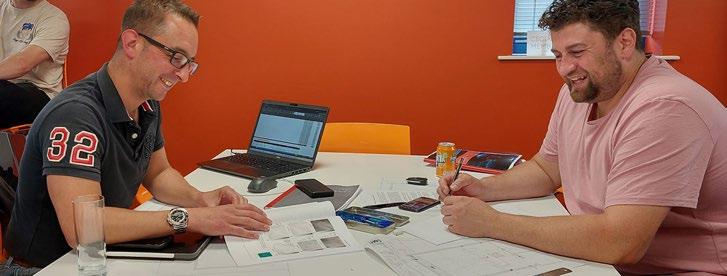
OVERVIEW
Every installation requires planning as part of a wider project. An installation engineer should clearly understand their role in the wider aspects of the projects they are involved in. This allows engineers to plan their time, work with other team members and communicate in the most efficient way possible. This course will explore all of the project and business processes that a Home Technology Professional can expect to be involved in.
TOPICS COVERED INCLUDE:
- Project phases.
- Working on-site – the builders project phases.
- Stakeholders and the engineer.
- Being part of the business.
- Maintenance and warranty the engineers role.
LEARNING OUTCOMES:
- Understand the five phases of a project, and where the engineer fits in.
- Recognise the terminology and phases of the on-site project.
- Explain who the stakeholders and their importance to the business.
- Understand the importance of maintenance and how it affects engineers.
COSTS
29
Smart Home Technician Further Skills
Members £199 +VAT Non-Members £299 +VAT
NETWORKING SPECIALIST SCHOOL
NETWORKING 3-DAY PACKAGE
• Member:
£449 (+VAT)
• Non-Member:
£749 (+VAT)
TCP/IP has become the dominant communications and media transmission protocol for the home technology industry. It is essential to understand both the theory and practice of IP in order to design and implement reliably. In addition, with wireless infrastructures being asked to handle ever more demanding applications, it is also critical that these are designed and implemented in a robust and reliable fashion.
To meet these demands, CEDIA has created a whole suite of IP Networking courses to improve the understanding and skill set of technicians within the industry. In this training pathway, you will learn how to implement TCP/IP connected hardware in many of the situations encountered in the residential environment.
Supported by a CEDIA certified subject matter expert, you will learn a vast amount of technical knowledge and get involved in hands-on activities designed to give you a feel for those on-the-job tasks.
THIS PATHWAY INCLUDES THE FOLLOWING COURSES:
• Residential Networking (see page 31)
• Wireless Residential Networking (see page 32)
• Advanced Residential Networking (see page 33)
WHO SHOULD ATTEND THIS COURSE?
• Developing smart home network technicians
• Technicians with some ‘try it and see’ network experience
• Technicians installing basic smart home / IoT devices
• Technicians preparing for the IST and ESC-N Networking Specialist certifications
RECOMMENDED READINGS:
• CEDIA’s Advanced Residential Electronic Systems
• CEDIA White Paper: Securing the Residential Network
30
residential networking

OVERVIEW
With the vast majority of subsystems now having the ability to be converged over an IP network, this is arguably the most important topic for smart home technicians.
CEDIA’s Residential Networking course will provide attendees with the foundation for understanding IP (the Internet Protocol). Starting from the ground up, the course will increase attendees IP networking knowledge, and clarify the common network protocols such as TCP, UDP, IP, DHCP, DNS, and NAT. Attendees will also understand the functions of a consumer router in a wired environment and begin basic troubleshooting in a consumer level IP network.
During this course students will carry out hands-on exercises to both test and expand on what the have learned. This course will cover the basic IP Networking knowledge of the curriculum required for the ESC-N certification exam.
COSTS
KEY SKILLS YOU WILL LEARN:
- Understanding the 7 layer OSI Model and how it relates to networking (essential learning).
- Applying the OSI model to residential network setup and testing.
- Recognising and choosing basic network hardware.
- Assigning and documenting IP Addresses - using the right addresses for the right job.
- Basic network troubleshooting.
LEARNING OUTCOMES:
- This course is appropriate for junior technicians, as well as anyone looking to formalise and increase their existing IP networking knowledge.
31
NETWORKING SPECIALIST SCHOOL
Members £199 +VAT Non-Members £299 +VAT
wireless residential networking

OVERVIEW
WiFi connectivity is a key communication method for much of the personal technology we use today. The increasingly crowded WiFi spectrum is busy delivering media, email, VoIP and other services to homeowners and their neighbours! With this in mind, it’s essential that technicians fully understand wireless technology to ensure fast, and reliable service to their customers.
This course goes back to basics to understand the fundamental technology behind wireless, and RF (Radio Frequency) transmission as a physical layer in the OSI model. The course will compare wireless to other physical layer types and explores the behaviours of RF considering data speed, frequency and coverage. You will learn the benefits and opportunities of wireless security, and explore how to ensure secure networks and how to expand a wireless network to cover larger areas.
This course assumes a fundamental knowledge of IP networks. Candidates should come armed with a firm understanding of the wired network environment, having successfully completed CEDIA’s Residential Networking course.
COSTS
KEY SKILLS YOU WILL LEARN:
- Understanding Wireless as a physical transport media.
- Radio Frequency transmission as part of the Electromagnetic spectrum.
- Controlling and / or maximising wireless coverage using different Antenna types.
- Protecting wireless networks with appropriate security.
- Expanding wireless networks to new areas or adding additional networks.
- Controlling wireless networks with management systems.
LEARNING OUTCOMES:
- Plan an effective wireless installation in a residential setting.
- Choose appropriate wireless hardware.
- Configure a secure wireless network.
- Document a typical wireless installation.
- Test a wireless installation for coverage and speed.
32
NETWORKING SPECIALIST SCHOOL
Members £199 +VAT Non-Members £299 +VAT
advanced residential networking
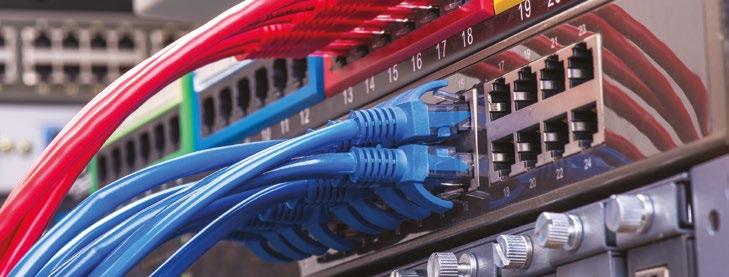
OVERVIEW
Once the basics of IP Networking are understood, there are many options to extend IP networks and create a truly integrated home environment.
This course will advance on from the Residential Networking course, exploring more in depth the skills and knowledge previously gained. Attendees will understand and be able to confidentially install a robust, secure and more complex network.
The course features a mix of classroom and practical exercises using a variety of networking equipment. There will be plenty of time for attendees to ask questions and discuss practical scenarios and enhance individual knowledge.
KEY SKILLS YOU WILL LEARN:
- Basic DNS operation.
- Remote access including Dynamic DNS.
- The Client - Server model.
- ‘Ports’ and ‘Services’.
- Access to LAN devices from the WAN via Port Forwarding.
- Securing remote access using VPNs (Virtual Private Networks).
- Understanding basic subnets.
- Diving Networks using vLANs (Virtual LANs).
LEARNING OUTCOMES:
- Describe the difference between UDP and TCP (OSI layer 4).
- Identify client, server and mixed mode network devices.
- Configure a Dynamic DNS account for remote access to a network.
- Setup and test remote access to a LAN device using ports & services.
- Configure a VPN service for remote access to a network.
- Describe the security implications for different remote access options.
- Explain the primary role of the subnet mask.
- Setup a port-based vLAN within a router.
COSTS
33
NETWORKING SPECIALIST SCHOOL
Members £199 +VAT Non-Members £299 +VAT

34
THE DESIGNER
The role of a designer ranges from interviewing the client and evaluating their needs, to specifying the functionality and performance of a system, and designing wiring schemes and user interfaces.
Every designer should be up-to-date with emerging technologies and new products which can be used to solve unique challenges for the client.
When it comes to installation time, it is important that the designer has solid understanding of every sub system, how it works, how it’s controlled, and how it fits within the larger project.
35
design documentation

OVERVIEW
From felt tipped pens to change orders, method statements and risk assessments, the designers’ toolkit is essential to any project. Without it, no project will ever reach a successful conclusion. This course is designed to give you a better understanding of project documentation, with a CEDIA certified subject matter expert on hand to teach you how to prepare and create your own.
During this 1-day course, you will be exploring and explaining the documents that make up a successful project, from architectural plans, schematics, wiring schedules, change order forms and specifications to final client sign off. You will also learn how to prepare, draw and write your own documents, and you’ll learn how to read and understand documents issued by others during the project process.
Along with detailed drawing and documentation packs, the course will also examine power requirements, heat output for racks and spatial considerations amongst others.
KEY SKILLS YOU WILL LEARN:
- Technical detail drawing.
- Better understanding of all documentation in a project.
- Including: change orders, Gantt charts, RFIs, method statements, risk assessments.
LEARNING OUTCOMES:
- Explain the types of documentation included in a successful project.
- Prepare and create your own documentation.
- Design and draw a simple audio-visual head end.
- Identify all elements required for the designer’s toolkit.
- Understand power requirements, heat output for racks, and spatial considerations.
WHO SHOULD ATTEND?
- Senior technicians in the business.
- Individuals involved in the design and management of a project.
- Technicians or Project Managers preparing for CEDIA’s ESC-D certification.
- IST certified individuals looking to upskill.
COSTS
36 DESIGNER
Members £199 +VAT Non-Members £299 +VAT
PROJECT MANAGEMENT

OVERVIEW
Project Management is the application of processes, methods, knowledge, skills and experience to achieve the project objectives. This course will teach you more about the role of a Project Manager on a CI project, and will identify the key elements required to successfully deliver a project on time, on budget, and within scope.
During this 1-day course, delivered by a CEDIA certified subject matter expert, you will discover the essential skills that every project manager should have in the field of custom installation. You will learn about the time, cost, and quality restraints on a project, within the context of the smart home technology industry, and explore the key principles of project management.
KEY SKILLS YOU WILL LEARN:
- Project management best practices.
- Balancing the three main project constraints – time, cost, quality.
- Working within a budget.
LEARNING OUTCOMES:
- Identify the principles of project management.
- Understand the role of the Project Manager.
- Explain the time, cost, and quality triangle.
- Recognise the key elements required to successfully deliver a project on time.
- Understand how to work on a tight budget and within scope.
WHO SHOULD ATTEND?
- Senior technicians in the business.
- Individuals involved in the design and management of a project.
- Technicians or Designers preparing for CEDIA’s ESC-D certification.
- IST certified individuals looking to upskill.
COSTS
37 DESIGNER
Members £199 +VAT Non-Members £299 +VAT
Home Cinema Design Workshop
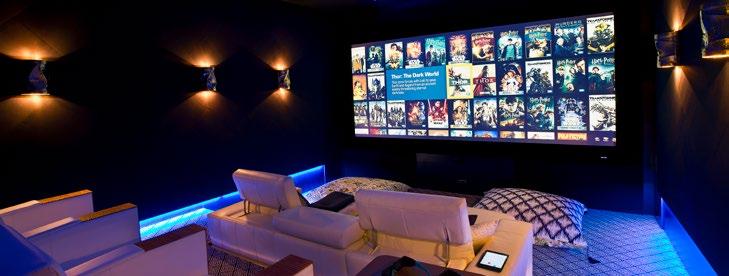
OVERVIEW
Explore the formal skills required to design dedicated home cinemas and media rooms in this 2-day workshop and learn home cinema design recommended practices from a CEDIA certified subject matter expert.
During this 2-day workshop, you will learn the engineering principles involved in high-performance design, starting with how to assess client needs and progressing on to real-world design. You will also learn to use engineering calculations and understand the science required to create a complete design, all while following and demonstrating world-recognised standards and recommended practices.
Throughout this course, you will study the theory of cinema in detail, and undertake a design exercise for both audio, video, and other associated factors including data, heat, and lighting. During day two of the course, you will take part in an interactive workshop to design a cinema from a real client brief including a peer-reviewed design assessment.
COSTS
KEY SKILLS YOU WILL LEARN:
- Client needs assessment.
- Following home cinema design recommended practice.
- Audio & video performance calculations.
- Understanding equipment specifications.
- Recognising and eliminating performance problems at the design stage.
- Producing formal design documentation.
WHO SHOULD ATTEND?
- Smart Home technicians adding Home Cinema & Media room to their service offering.
- Home cinema professionals and designers looking to formalise home cinema and design knowledge.
- Experienced smart home technicians moving into a designer role.
- CEDIA Awards entrants needing to understand documentation requirements.
- CEDIA Outreach Instructors looking to deliver the “Designing Home Cinema and Media Rooms” CPD.
38
Members £349 +VAT Non-Members £499 +VAT DESIGNER
Lighting DESIGN
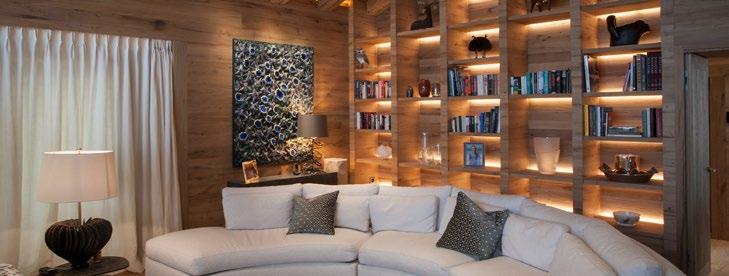
OVERVIEW
Lighting control installation can be a profitable area for residential integrators. However, systems should be designed, installed and documented correctly for long-term reliability. Lighting technology has advanced a great deal in recent years. It is now a highly complex field.
This 2-day course starts by exploring lamp types, their characteristics and capabilities. A strong emphasis is placed upon the science behind the ‘art’ of lighting. Other subjects covered include colour temperature, power law, series vs. parallel wiring, voltage drop and cabling sizing. All technical discussions reference the BS7671 electrical standards.
Following on from the lighting fundamentals covered on the first day, day 2 provides a more in-depth understanding of the subject. It focuses on the practical application of lighting control in the residential market.
FOLLOWING THIS COURSE YOU
WILL:
- Understand different lamp types.
- Identify the different transformer and ballast types.
- Provide fundamental science needed for lighting control system design.
- Understand different dimming control methods.
- Understand the lighting control system regulations.
- Identify, solve and implement complex lighting control solutions.
- Explore ancillary devices and their wiring requirements.
- Understand the energy and eco considerations.
COSTS
39 DESIGNER
Members £199 +VAT Non-Members £299 +VAT
Other Technical Courses
If you are looking to further your technical knowledge, these courses are ideal for those who have already completed Technical School, or those that wish to develop their skills in different areas.
OTHER TECHNICAL COURSES IN THIS SECTION INCLUDE:
• Designing Ethernet & Wireless Networks (see page 41)
• KNX Basic Training (see page 42)
40
Designing Ethernet and Wireless Networks

OVERVIEW
The IP network is the backbone of every modern custom installation and the number of connected devices is ever growing. With this in mind, it is now crucial that the fundamental design of any home network is robust and well conceived. It is no longer good enough to just ‘plug it in to any available socket’ come install time!
This course explores all aspects of modern network topology including traffic flow, infrastructure planning, connectivity options and planned redundancy. During the session, students will be working in groups to develop a robust network that will be stable for an initial and developing list of connected host devices. Wired and wireless connectivity will be included as well as host devices from the AV, computing and mobile world.
Both wired and wireless networks will be considered with consideration for retro-fit and new build properties. Additional subject matter includes; power planning, equipment location and rack design, testing strategies, and upgradability.
COSTS
KEY SKILLS YOU’LL LEARN:
- Traffic demands of individual traffic types.
- Analysing traffic flow with network tools.
- Comparison of network topologies.
- Finding and planning trunk routes.
- Host planning for wired & wireless networks.
- The case for fibre-optic infrastructure.
- Optimising wireless service.
- Approximating bandwidth needs.
- Bandwidth limiting topologies.
- Security considerations.
THIS COURSE IS IDEAL FOR:
- Developing smart home network technicians.
- Individuals who have attended CEDIA’s Networking Specialist School courses.
- Technicians wishing to gain a deeper understanding of optimised network design.
- Individuals preparing for the ESC-N Networking Specialist certification.
41 OTHER TECHNICAL COURSES
Members £199 +VAT Non-Members £299 +VAT
KNX BASIC COURSE

OVERVIEW
Automating a building has far-reaching benefits for integrators and occupants. With KNX, functions like lighting and AV control, security, energy management, and HVAC can work as a uniform system, which is the essence of interworking and interoperability. The KNX Standard provides a unique platform to integrators to deliver a modular and scalable solution that works in all types of buildings, saves energy, and improves health and wellbeing.
This hybrid course includes 6 self-paced online modules covering how to design the KNX Topology to ensure reliable systems, the history of KNX, installation of the system, and how KNX bus devices operate.
The online training is followed by a 3 day on-site practical course which covers how to use ETS to program KNX using lighting and shading examples, how to run diagnostics with ETS, and finishes with the Theory and Practical Certification exams. Upon successful completion of both theory and practical certification exams, you will be registered as a KNX Certified Partner.
COSTS
MODULES INCLUDED:
- KNX System Overview.
- KNX System Arguments.
- TP Installation.
- TP Topology.
- Bus Devices.
- KNX and RF.
- ETS Programming.
WHO SHOULD ATTEND?
- The course is for anyone looking to gain a fundamental knowledge of the KNX ecosystem, and aiming to become a certified KNX partner.
42
Members £749 +VAT Non-Members £899 +VAT
OTHER TECHNICAL COURSES
MEMBERS ONLY
CEDIA is continually expanding and improving its course selection, adding value to the industry by encouraging its members to strive for excellence.
The following course is exclusive to CEDIA members, and offers opportunities for members to differentiate themselves from others installers in the smart home industry.
MEMBERS ONLY COURSES INCLUDE:
• CEDIA Outreach Instructor (see page 44)
43
OUTREACH INSTRUCTOR (COI)

OVERVIEW
This course gives CEDIA members the tools they need to engage with the design and build community. Exclusive to CEDIA members, this course will allow you access to our accredited continuing professional development (CPD) presentations, that have been accredited with RIBA, BIID, SBID. You will discuss best practices, discover insights to the design and build audience, as well as how to create valuable relationships with design and build professionals.
WHO SHOULD ATTEND?
- This course is available for any CEDIA members that have taken the presentation skills training course and have a valid CEDIA membership.
ACCREDITED CPD COURSES:
- Designing the Connected Home.
- Outdoor Technology: Extending the Living Space.
- Cabling for the Integrated Home.
- Introduction to Integrated Lighting Design.
- Designing Home Cinemas & Media Rooms.
WHAT DO WE COVER IN THE DESIGN AND BUILD COURSE:
- Key differentiations between professions within the Design and Build industry and how to best use these to your advantage.
- Social Media tips and tricks.
- Discuss your elevator pitch, and how best to present yourself to the D&B community.
- Mid to long term business plan creation to create long lasting relationships.
If you are interested in this course, please contact Imogen Dent, Design & Build Program Specialist – designbuild@cedia.org
44
MEMBER ONLY COURSE





The State of Wellness What is 4D Sound? A New Dimension in Immersive Audio smart homes for sustainable & independent living EPISODE 373 EPISODE 369 EPISODE 362 TUNE IN FOR CANDID DISCUSSIONS ON EMERGING SMART HOME TECH
OTHER TRAINING EVENTS
CEDIA offers a number of ways in which to help students continue their professional development.
From third-party training, to international events, there are always ways in which you can maintain your CEU points and grow your knowledge within the industry.
46
CEDIA Tech + Business Summits
The CEDIA Tech + Business Summits are free, regional events that feature presentations on the latest technology in the industry.
As well as attending these informative seminars, attendees also have the chance to visit product displays from top trade suppliers and manufacturers, allowing valuable one-on-one time with the brand representatives.
Aimed at home technology professionals, the Tech + Business Summits also provide a great opportunity to network with industry peers and build strong business relationships.
These annual events take place in various locations across the UK –visit cedia.org/techsummits to see dates for all upcoming events.


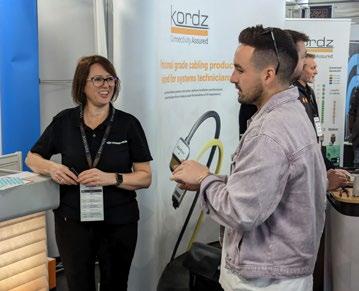
47
INTERNATIONAL EVENTS
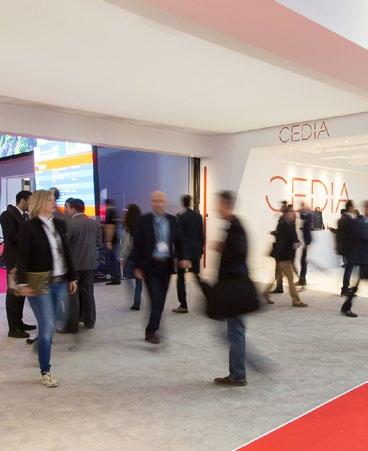
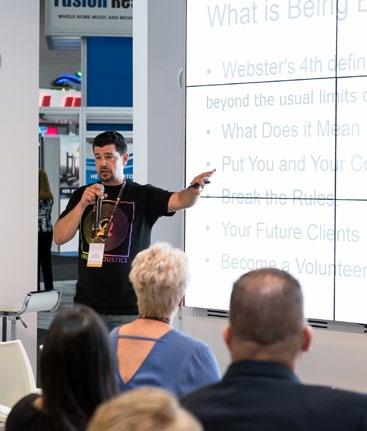
ISE
FIRA Gran Via Barcelona, Spain
Integrated Systems Europe (ISE) is the world’s largest AV systems integration show.
ISE showcases the latest cutting-edge technology, products, and solutions being produced around the globe.
CEDIA provides a jam-packed education programme at ISE every year and is the place to be to if you are looking to increase your knowledge and skills as well as meet other industry professionals.
For more information on ISE, visit www.iseurope.org
CEDIA EXPO
Denver USA
Every year, more than 20,000 home tech pros convene in the USA for the leading event in connected technology.
At CEDIA Expo you can get certified, access innovative new products, learn from industry experts, and attend world-class education sessions from CEDIA instructors.
For more information, visit www.cediaexpo.com
48

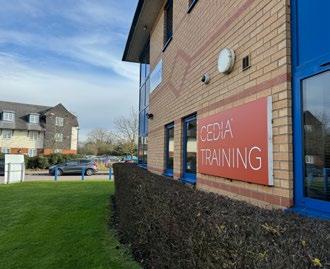

The CEDIA Training Facility, based in St Neots, Cambridgeshire, is available to hire.
Consisting of a meeting room, a classroom, a practical workshop and a breakout area, the training facility has the ability to hold multiple training sessions to many delegates.
CEDIA members can take advantage of two days hire of the training facility for free per year.
To book the facility, email education@cedia.org
49
CEDIA training facility
Hire the



find us Unit 2, Phoenix Park, St Neots, Cambs, PE19 8EP, UK Tel: +44 (0)1480 213744 Email: education@cedia.org
www.cedia.org Huntingdon St Neots Sandy Biggleswade Bedford A1 A14 A1 A428 A1198 A428 Cambridge St Neots A428 Huntingdon A1 North A1 South h A428 Cambridge St Neots A428 Cambridge St Neots A1 Premier Inn B1428 Phoenix Park CEDIA Headquarters and Training Facility
Web:



























































